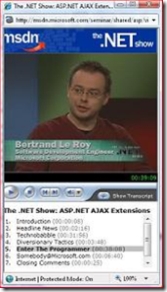Tales from the Evil Empire
Bertrand Le Roy's blog
-
Old iPaq and Media Player 11?
This is so frustrating I thought I'd just make a blog post and see if someone has a solution. I have an old HP iPaq of the 1900 series, partnered with my Vista Laptop. I like that old PocketPC because it's fairly slim, easy to program and runs a few nice emulators like the ScummVM (mmmh, Sam & Max...). Anyways, every single freaking time I launch Media Player on the laptop, if the iPaq is docked, I'm getting a dialog box that says "your device is using an outdated driver that is no longer supported by Windows Media Player. For additional assistance, click Web Help." No "don't show this again" checkbox, you have to endure the dialog every single f*#$% time.
-
Surface computing is here
Just amazing. I had seen this at internal Microsoft events and knew that something was cooking, but it's almost here. Not just a cool tech demo anymore but something that launches this winter and can already be used at the New-York Sheraton.
-
Microsoft Ajax events - part 2: exposing events from custom classes
-
The Wiimote doesn't work...
... for anything else than aiming and frantically moving up and down. In other words, slow movements aimed at the screen work well, as do fast, imprecise movements, but anything else is impractical.
-
Microsoft Ajax events - part 1: subscribing
When building Ajax applications, you basically deal with two kinds of events. First, there are DOM events, and second, events from JavaScript objects. This second category is not part of the EcmaScript specs (or of the DOM specs, of course) so each framework needs to define its own pattern to expose events. This makes it more difficult for developers to include components built on different frameworks into a single page, which is one of the problems that OpenAjax tries to solve. I'll get back to this in a future post and show how to integrate Microsoft Ajax events in the OpenAjax hub.
-
What?????
I just don't understand Sony's PR strategy...
http://www.dailymail.co.uk/pages/live/articles/news/news.html?in_article_id=451414&in_page_id=1770&ct=5 -
Woohoo! I'm on TV!
 The latest episode of the .NET show is all about ASP.NET Ajax. Brad and Matt first have a really interesting discussion of the history and architecture of ASP.NET Ajax and then you can see me demo-ing UpdatePanel, extenders and localization.
The latest episode of the .NET show is all about ASP.NET Ajax. Brad and Matt first have a really interesting discussion of the history and architecture of ASP.NET Ajax and then you can see me demo-ing UpdatePanel, extenders and localization. -
PrtSc now useless... or maybe not.
While looking for the character map in the accessory folder of Vista, I found a little gem that I just have to share. Vista now has a Snipping Tool that enables you to capture parts of the screen, highlight and draw on top of it and copy or save the results. Some would say it's about time and that there's about a million freewares that do this already, I'm just happy to have found it right there in Windows. It can even take non-rectangular snips:
-
The format for JavaScript doc comments
Xml documentation annotations are going to drive JavaScript IntelliSense in Visual Studio Orcas (the next version of Visual Studio). For more than a year now, we've been including xml doc comments to all public APIs in the Microsoft Ajax Library (which are a great place to check out some examples of those comments). We also use the doc comments to automatically generate parameter validation code in the debug version of our scripts.
-
How to keep some context attached to a JavaScript event handler?
The problem is the following... You want to attach a handler to a DOM event but you want some information to remain associated with it. Let's say for example that the handler is a method of an object that makes use of the "this" pointer somewhere in its body (as it should, otherwise it should probably be static). As the API to attach a handler just takes a function pointer, and the "this" pointer is determined by the DOM element that triggered the event, it seems difficult to do. The Microsoft Ajax Library (like almost all Ajax libraries, let's be honest) provides an easy way to work around that. If you call:
